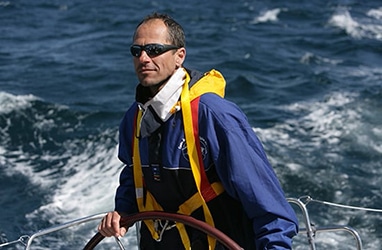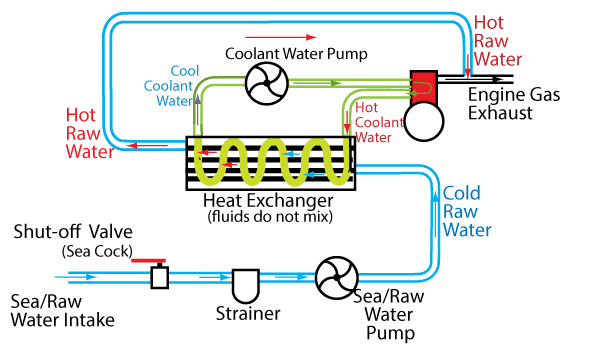
This article is an excerpt from NauticEd’s online Skipper Large Keelboats Course, a comprehensive online sailing course for beginner to intermediate sailors to learn how to sail large sailboats 26 ft (8m) and above. The Skipper Large Keelboats course is part of the Skipper Course Bundle of online courses, also teaching you how to master maneuvering under power and docking!
You can learn to sail and improve your sailing with NauticEd, the international leader in sailing education.
Sailboat Diesel Water Systems
Diesel engines run hot because of high compression and therefore need to be cooled. Fortunately, ample cooling is readily available from the water the vessel is sailing in. However, since ocean water is highly corrosive due to salt content, ocean water itself does not cool the engine. Rather, the ocean water exchanges its heat with coolant water – the same type of coolant water you find in a radiator in a car.
Thus, there are two water systems in a marine diesel engine.
The raw-water system and the (internal) closed-coolant system. The internal coolant contains fresh water and antifreeze, similar to an automobile. This mixture flows around the cylinders and draws heat away from the combustion, making the water hot. This hot water mixture is then pumped to a device called a heat exchanger whereby it exchanges heat with the raw water system. The coolant water system is also called the closed water system because it never exits the engine area.
The raw-water cooling system pumps ambient water from outside the hull into a second part of the heat exchanger where it drains off heat from the internal water/coolant system and then exhausts this raw water out through the engine gas exhaust system into the lake or ocean. This heat exchanger functions much like the radiator on an automobile, except it uses raw water instead of air. Whenever you start the diesel engine, it is a good idea to look at the exhaust and ensure that you observe water exiting the exhaust along with the engine gas exhaust.
These two water systems needed for cooling a diesel engine are almost foolproof. A problem may occur if the raw water intake in the hull becomes clogged due to kelp or other clogging material. Another issue you might experience is that the raw water pump impeller may break which prevents the flow of raw water. In both cases, the coolant water temperature will rise beyond acceptable. Your engine temperature gauge and horn will alert you to the fact that you have a coolant water temperature issue. Stop the engine immediately if this sound occurs else permanent (expensive) damage to your engine will occur.

Diesel Cooling Water Systems
You can learn more in the Skipper Course....
Knowledge and theory for longer distances and overnight sailing in diverse conditions. The Skipper Course is a comprehensive online sailing course for beginner to intermediate sailors wanting to learn how to sail larger sailboats 26ft to 56ft. Or upgrade to the Skipper Course Bundle of online courses to also master maneuvering under power and docking!
